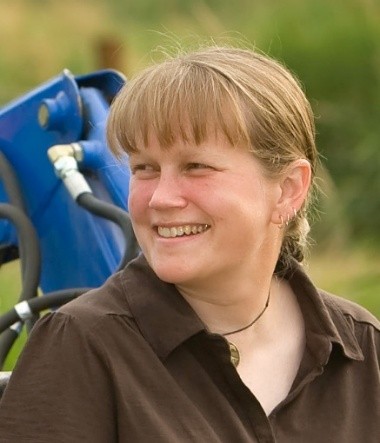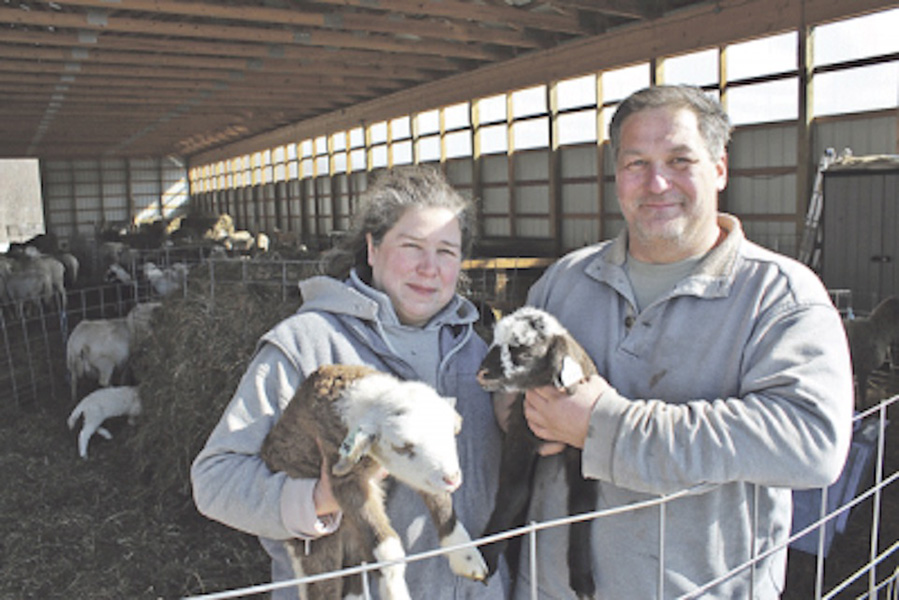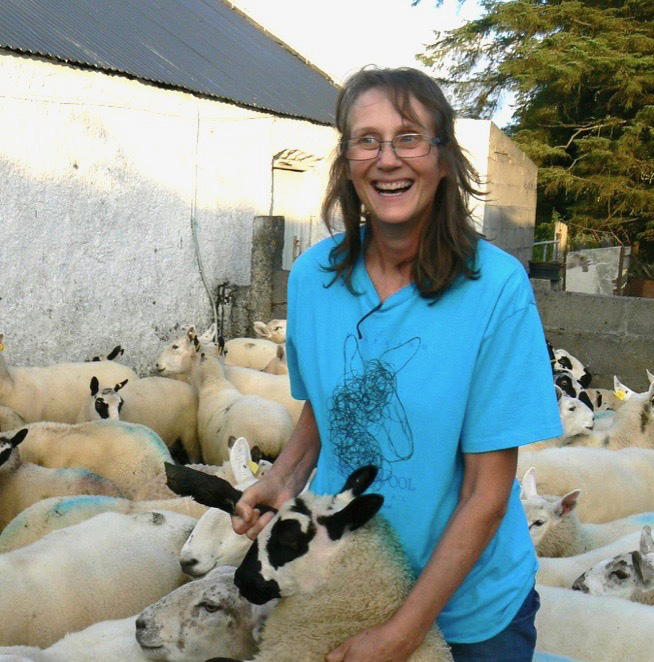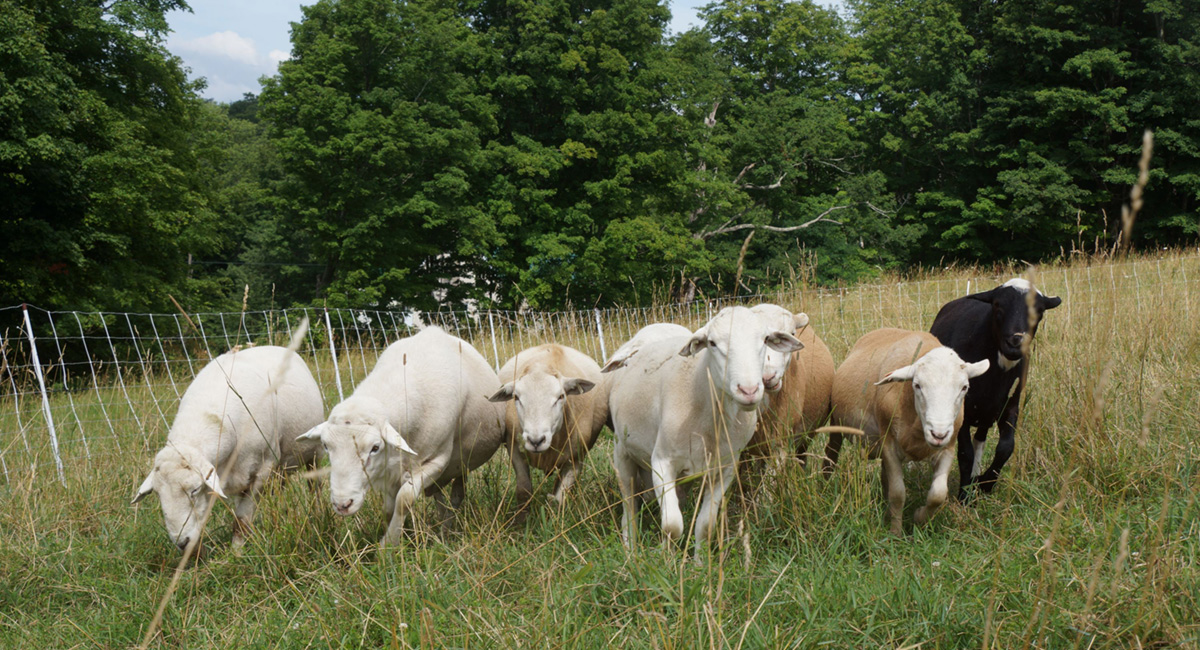News from the OPP Society
“I continue to teach the introductory sheep production course here at Iowa State University, and every year I teach students about OPP. The information you provide periodically makes it quite easy for me to keep my students up to date . . . Keep up the good work!”
DR CURTIS R YOUNGS
IOWA STATE UNIVERSITY
UNSOLICITED CORRESPONDENCE
OPP Update – Spring 2025
Hello OPP Society members!
I’m Michelle Canfield, and I’m the Treasurer of the OPP Society.
I hail from Snohomish, WA; a suburban region with a lot of floodplain and fertile river bottom ground, 45 minutes NE of Seattle. I live on and steward a 37-acre farm and run about a hundred head of Katahdin ewes. I sell grass-fed lamb, NSIP seedstock, and even plenty of “lawnmower” pets! The homesteading and local food movement, as well as the ethnic market, is strong in our area, and we have amazing grass year-round in our temperate rainforest climate. It’s a great place to grow sheep!

I stumbled into OPP awareness more than a decade ago from doing some surveillance testing with my local university lab; and to my shock, having a whole bunch of healthy ewes test positive. At the same time, a few of my local friends were discovering they also had OPP, and I had some shared genetics with those farms, including a recently procured positive ram. So, the endeavor began between all of us to eradicate it.
I was thrown a curve ball in that I was having cross-reactivity with the chlamydia vaccine, discovering that I was seeing false positives in my lab test results from this. Through support and guidance from members of The OPP Society, was able to get this figured out, using the University of Minnesota’s “Elitest” and repeated testing and culling. I was lucky, it turned out I only had a few truly positive animals and was able to get out of the woods quick. After several years of 100% negative testing, I’ve now backed down to 30% surveillance, maintaining a closed ewe flock, and testing incoming rams multiple times. I also had a similar brush with CL, thankfully catching it quick and being able to cull those animals before it spread. I also now test for Johnes. My local friends didn’t fare as well, one had such serious problems with OPP that they were at the point of losing double digit % of lambs and ewes each year to OPP effects. Thy had to hard-cull more than a third of their flock, and continue to test and cull for several years to get clear of it. Another two friends got out of the sheep business, partly due to frustrations with OPP. Their financial and emotional hardship from this disease really helped hit home for me the importance of prevention. In my day job, I’m engineering program manager in the medical device industry. Healthcare and disease prevention of all species is an important priority for me! I am happy to serve on the board of The OPP Society. I hope we can continue to support and reach other sheep producers who care about eradication of the diseases which economically burden our industry. Please join us!
OPP Update – Fall 2024
Our longtime Secretary Judy Lewman, as well as longtime Treasurer Jean Walsh have moved to advisory positions on the board. Thank you both for all your efforts in promoting and keeping the OPP Society running smoothly.
Dr Holly Neaton and Dr Cindy Wolf have a new article Small Ruminant Lentiviruses and Caseous Lymphadenitis recently published in the Veterinary Clinics of North America.
Renewal notices are currently going out, thank you for supporting us by continuing their memberships. Welcome new members, we are grateful that you joined our organisation. Your membership fees help us to keep this website up and running. Thank you for your ongoing support.
OPP Update – Summer 2023
We want to thank everyone who has supported us by continuing their memberships. We continue to be a reliable source of accurate, up to date information regarding Ovine Progressive Pneumonia. Membership dues are the sole source of revenue keeping the lights on (website up). So thank you again.
Last Summer Dr. Holly Neaton was interviewed on the Podcast “Sheep Stuff ewe Should Know” regarding OPP. It’s a very good informative Podcast, here’s the link: https://podcasts.apple.com/bz/podcast/105-opp-yeah-ewe-know-me/id1508106193?i=1000569001921
Lastly, and sadly, Jim Schultz, one of the co-founders of the OPP Society passed away in May. Click here to read his obituary.
– Member bios have always been well received, so we’re making this a regular feature –

Isabel and Etienne Richards
Gibraltar Farm – North Brookfield, New York
Originally from South Africa, where their grandparents farmed and taught the couple land stewardship, the Richards came to the US in 1999 and made careers as a small-animal veterinarian and IT software professional until an apprenticeship altered their path.
In 2013, Isabel hung up her stethoscope for a yearlong position at the Stone Barns Center for Food and Agriculture, where she “fell in love with sheep.” The experience “propelled us to pursue a quieter farming career upstate, away from the hustle and bustle of suburban life.”
Their passion to get back to the land took them north, to a 110 acre farm in the Sangerfield River Watershed. “When we walked the land with the realtor and saw the potential, and how well it could be set up for rotationally grazing sheep, we were hooked,” said Etienne.
By June 2015, after more than a year of commuting and weekend-warrior work, the pair were farming full time with 15 ewes, some portable net fencing, a few pigs and some beehives. Now, just 8 years later, their highly productive NSIP Katahdin flock numbers 160 ewes.
To read the entire 2-page Troy Bishopp article, from which we excerpted, see:
https://countryfolks.com/grazing-sheep-inspires-conservation-award-for-gibraltar-farm/
For Isabel’s excellent OPP information, prepared for their fellow EAPK breeders, see:
https://easternalliancekatahdins.com/ovine-progressive-pneumonia-opp-2/
“I liken OPP in the flock to having a permanent nose bleed, might not kill you in the short run, but eventually—if it begins to bleed heavier (higher percentage)—it weakens the overall system and reduces the body’s ability to work at peak efficiency.”
GENE SCHRIEFER
PRODUCER / ED

Sarah Beamer
Kerry Hill Flock — Morgantown, West Virginia
We first met Sarah in 1990, halfway between West Virginia and Minnesota, to trade rams just prior to the breeding season. While OPP-negative at the time, all four of those Border Leicester gentlemen seroconverted within a few years . . . sadly typical of eradication efforts at the time.
Sarah’s eventual path out of the OPP woods proved to be embryo transfer, to which she had early access as a lab tech at West Virginia University. The next step was AI using imported Kerry Hill semen on Border Leicester ewes, with her current flock now up to 88% pure Kerry Hill.
Now retired from WVU, where she co-authored many publications, Sarah’s journeys have included a long-planned trip to the UK (photo) for new genetics. More recently, one of her yearling rams took Reserve Champion in his class at the 2023 Maryland Sheep and Wool Festival!
While the Kerry Hill is a relatively new breed in the US, numbers are growing as producers are drawn to their striking appearance and meaty conformation. For more information, check out the breed’s new website: https://americankerryhillassociation.com
Minnesota Program Achieves Full Status
Piloted since 2006 by OPP Society volunteers under the auspices of the Minnesota Board of Animal Health, with full support of the University of Minnesota Veterinary Diagnostic Laboratory and USDA-Veterinary Services, this project has recently graduated to full program status. With the groundwork now laid, the hope is that other states will follow.
Any Minnesota sheep or goat producer is eligible to apply. Details of the program can be found on our Library page.
TMEM154 Genetic Test for OPP Susceptibility
Developed by USDA scientists at the Meat Animal Research center (USMARC) in partnership with Gene Seek, a Neogen Corporation division in Lincoln, Nebraska, this test is based on results validated in collaboration with USDA colleagues in Idaho and Washington state. Still available from Neogen as a separate TMEM154 assay, this test has also been commercialized as a component of Flock 54.
While TMEM154 testing reports risk level for infection with the OPP virus, it does NOT tell you whether or not an animal is infected! If eradication of OPP is the shepherd’s goal, then removal of the reservoir by serologically testing and culling of positive animals is necessary. For more, see our Testing page. Extensive information on genetics and OPP can be found on our Library page.
“Elitest” ELISA Now Available in the US
Of more than 30 ELISAs noted for detection of OPP/CAE, ‘Elitest’ is the only one validated to standards of the World Organization for Animal Health (OIE). This test was developed through a collaborative effort by laboratories in the UK, Spain, Italy and Belgium, and is used in control and eradication programs worldwide, including Ontario and Minnesota.
‘Elitest’ is now offered by the University of Minnesota Veterinary Diagnostic Laboratory with a fee of $6.50 per sample plus a $10 accession fee for each lot submitted. Out-of-state submissions add 10%. Submit 1 ml of serum for this test.
Photo Credits
We’re always looking for great photos. Members please send your best shots to any director.
- WELCOME: Hiemke, Wisconsin
- ABOUT OPP: Rocha, Texas
- TESTING: Hasbargen, Minnesota
- ORPHANING: Vaassen, Wisconsin
- SHOWING: Fisher, Idaho
- ABOUT US: Schultz, Wisconsin
- MEMBERS: Barinaga, California (Paige Green photo)
- VETERINARIANS: Neaton, Minnesota
- LIBRARY: Leder, Wisconsin
- LINKS: Scramlin, Michigan
- NEWSLETTERS: Wolf, Minnesota
- ARCHIVES: McGuire, Colorado
- NEWS: Richards, New York
- CONTACT US: Schultz, Wisconsin
